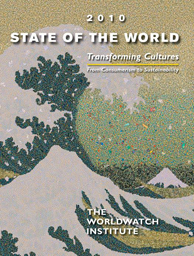 State of the World 2010 is on book stands, just in time for President Obama’s State of the Union address, though I’m not sure he’s read it given his talk of economic growth to create more jobs in businesses that require more stimulus spending and more government oversight.
State of the World 2010 is on book stands, just in time for President Obama’s State of the Union address, though I’m not sure he’s read it given his talk of economic growth to create more jobs in businesses that require more stimulus spending and more government oversight.
I’ve regularly blogged on our state of the economy, an economy inexorably based on the same life support systems that sustain every creature on Earth. At its root, the economy should be about caring for our planet in much the same way that Pope Benedict has recently proclaimed that we must care for Creation. “The different phenomena of environmental degradation and natural catastrophes, which unfortunately occur all too often, remind us of the urgency of dutiful respect toward nature, recovering and valuing a correct relationship with the environment each day,” said Pope Benedict (as quoted by the Catholic News Agency).
Our economy should be about sustainability and restoration of our fragile planet, not greed and never-ending growth. Our sense of fulfillment or happiness is rarely found at America’s Mecca (the mall). Nor will we be able to charge it on our credit card. When it comes down to it, we can buy what’s no longer available: clean water and air, healthy soil, a vibrant local community, a safe place to raise a family.
Pope Benedict’s message is along the same lines as the perspectives shared in Worldwatch Institute’s latest, authoritative flagship book, State of the World 2010: Transforming Cultures: From Consumerism to Sustainability (W.W. Norton). Without an intentional cultural shift – one that values sustainability not consumerism — no pledges from government or advances in technology will be enough to prevent the preventable calamity of climate change and ecological collapse, destined to forever change how we live on this planet. We must rediscover a story of living and working, quite different from the present consumption and material wealth-driven one that often defines meaning, satisfaction and acceptance for so many of us, with dire consequences for ecological systems and the billions of people who have been called the “have-nots” in the so-called developing world.
State of the World 2010: Transforming Cultures: From Consumerism to Sustainability is an insightful and powerful exploration of our cultural predicament, calmly calling for a peaceful cultural revolution and offering 60 distinct voices for change from today’s leading sustainability visionaries. In six succinct chapters, this example-laden book examines the six culture-shaping institutions – education, business, the media, government, traditions and social movements – and the role each must play in redefining the story of sustainability.
Last year in State of the World 2009, the Worldwatch Institute recognized how climate change was transforming the planet and how green businesses and other institutions could help reverse the damage wrought by global capitalism. In short, we cannot consume our way out of the Great Recession any more than survive an overdose of Hopium from politicians and technology-will-save-the-day enthusiasts who ignore our inescapable role in what’s happening to the planet.
State of the World 2010 dives into the reality that while the human population has grown exponentially, consumption of stuff has exploded almost three times more. “Consumption has grown dramatically over the past five decades, up 28 percent from the $23.9 trillion spent in 1996 and up sixfold from the $4.9 trillion spend in 1960,” writes Erik Assadourian, a Senior Researcher at Worldwatch Institute and Project Director of State of the World 2010. “Some of this increase comes from the growth in population, but human numbers only grew by a factor of 2.2 between 1960 and 2006…People in the United States alone spent $9.7 trillion on consumption [in 2006], accounting for 32 percent of global expenditures with only 5 percent of global population.”
From transportation to community gardens, from local enterprise development to redesigning products that can return to the earth in much the same way we do after we die, State of the World 2010 covers a wide gamut of possibilities. Will our human instinct for survival overtake the sugar-coated enticement to consume ever more? Will we remain so disconnected from nature and each other by gadgets and conveniences that we forget our place among the forests and rivers, eagles and fungi? Can we relearn to “consume” a view of a sunset without having to watch it on a plasma TV?
If anything, the international appeal of James Cameron’s Avatar movie – with an embedded appeal to save the Tree of Souls — offers a revealing comfort, if you’re not too jaded to believe the movie’s popularity to stem merely from its special effects. In the end, Avatar, and this book, may each, in their own way, help bring about the necessary cultural transformation that ushers in the Sustainability Millennium, helping redefine our well-being in ways that aren’t based on what we own, but rather, by how we interact with each other and care for the planet.
Photography: Book Cover art W.W. Norton


Very good site. Thanks a lot.
great post thanks a lot. enjoyed reading it!
Really nice site.
I have read most of the book…its a lot to absorb. Amazing book and quite insightful. And this review is excellent and sums up the book very well. Are we up to the challenge? Could be, as people seem to have become much more aware of the state of the environment and the plight of our planet. We can certainly hope so.